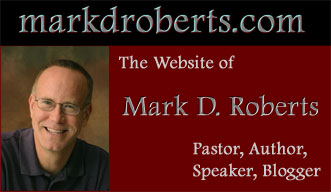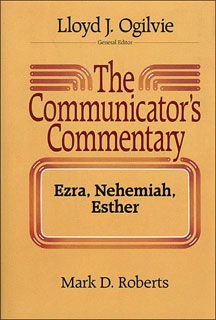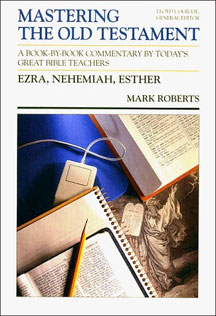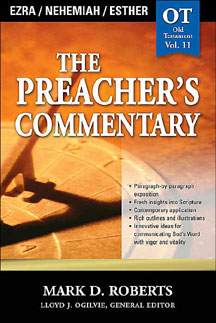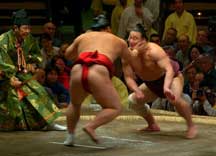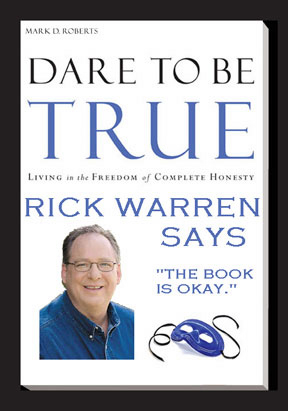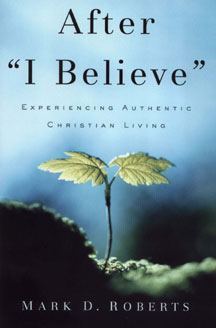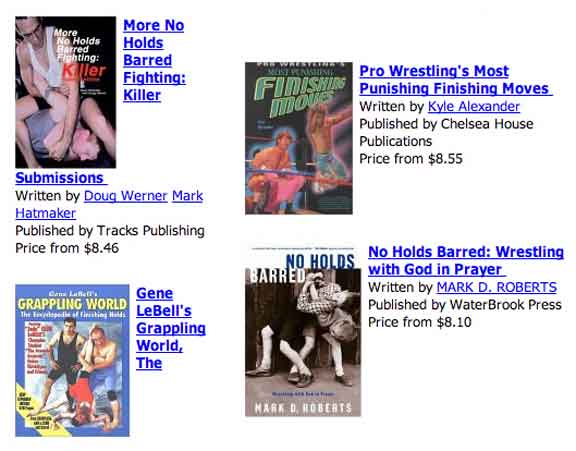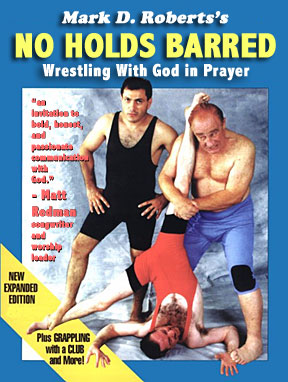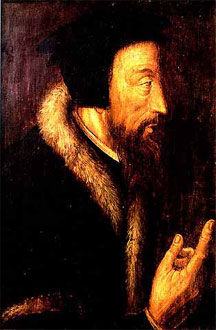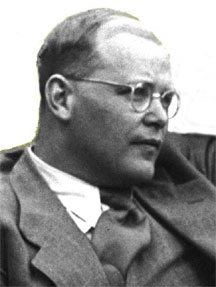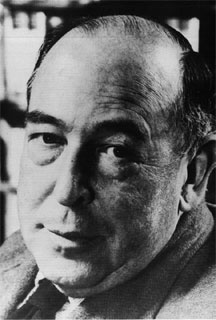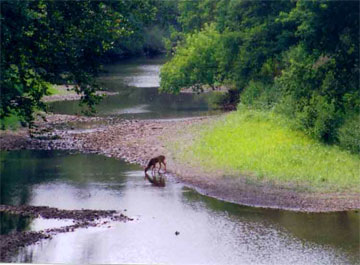| |
A Resource by Mark D. Roberts |
|
No Holds Barred:
Ruminations on Publishing and Prayer
by Rev. Dr. Mark D. Roberts
Copyright © 2005 by Mark D. Roberts
Note: You may download this resource at no cost, for personal use or for use in a Christian ministry, as long as you are not publishing it for sale. All I ask is that you give credit where credit is due. For all other uses, please contact me at mark@markdroberts.com . Thank you.
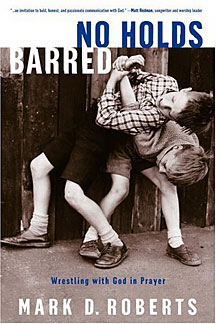 |
Introducing . . .
No Holds Barred:
Wrestling with God in Prayer
This book is an invitation to a deeper, truer, and bolder relationship with God. Based on the Psalms, No Hold Barred explores the depths of honest prayer, including asking, praising, silence, complaining, and even prayer for vengeance. It includes a study guide for personal or group study by adult classes or small groups
“This inspiring book is an invitation to bold, honest, and passionate communication with God. . . . Mark reminds us of the astounding freedom in prayer we find throughout the Psalms, and encourages us to take advantage of that freedom." - Matt Redman, songwriter, author, worship leader.
To purchase No Holds Barred, click here.
|
How Does It Feel to See Your Name on the Cover? 
Part 1 of the series: No Holds Barred: Ruminations on Publishing and Prayer
Posted for Monday, June 6, 2005
| Since my latest book, No Holds Barred, was released two months ago, I've been asked a bunch of questions about writing and publishing books, and also about prayer, the topic of No Holds Barred. Some of these questions have been asked by friends, others through e-mail or when I've been doing radio interviews related to the book. This series will include my responses to many of these questions, as well as some of my personal ruminations on book publishing and on prayer. |
Frequently Asked Question: How does it feel to see your name on the cover of a book?
When I was in my twenties, I wondered what it would feel like to publish a book. Since I was immersed in grad school at the time, it seemed inevitable that someday I would publish a book, even if it was some crusty academic tome that would quickly be forgotten in the musty stacks of theological libraries. I used to daydream about the pride I'd feel when I finally saw my name on the cover of a book. I figured it would be one of my life's crowning moments.
When I was in my mid-thirties and beginning my tenure as the senior pastor of Irvine Presbyterian Church, I had the chance to write my first book, a popular commentary on the Old Testament books of Ezra, Nehemiah, and Esther. This commentary was published in what was initially called The Communicator's Commentary, then Mastering the Old Testament. It has been recently re-released in what is now called The Preacher's Commentary. No doubt in a few years it will be re-released as the Communicating Master's Preaching Commentary or something like that.
Though my academic training had been in New Testament, I'd done enough Old Testament study and spent enough time studying the relevant languages (Hebrew and Aramaic, which appears in Ezra) so I felt up to the job of writing a commentary on three Old Testament books. Besides, I was writing, not for scholars, but for pastors and other Christian leaders.
I labored long and hard over that commentary, which ended up being 442 pages long. In the process I had my first experience of working with an editor. It was humbling, to say the least. My editor, a fine literary stylist, wasn't impressed with my ability to use twenty obscure words when ten succinct ones would communicate the same idea, only with greater clarity. I'd send her my manuscript, and she'd send it back covered with red ink. Never in my life had I felt so inept as a writer. In fact, to show you how low I had sunk in self-confidence, I felt literally thrilled when one page of my 600-page manuscript came back without a drop of red ink. That was the only unedited page, I might add.
By the time the manuscript was ready to be printed, I had probably spent 800 hours or more working on it. So, when I finally saw the first copy, with my name prominently displayed on the cover, what do you think I felt? Pride? Joy? Satisfaction? Well, maybe a bit of each. But my dominant feeling was relief. I was simply glad the commentary was finally done. The fact that my name appeared on the cover was, honestly, underwhelming.
I remember thinking this was strange. But, as I reflected further, I decided this was a good thing. It occurred to me that, if I felt too much pride over seeing my name "in lights," as it were, I'd be walking down a perilous road. It would be too easy to forget why I was writing books in the first place. It wasn't about my reputation. And it wasn't about money, because I didn't make all that much. I was writing for God's glory, for His kingdom purposes. Writing was simply an extension of my teaching and preaching ministry.
Thinking back on this experience, I believe God was very gracious to me in this whole process. There was a very real possibility of my ego becoming too wrapped up in my writing. Yet the ordeal of publishing my first book helped to protect me from this. |
|
|
|
|
Is it hard to judge a book by its cover? Then why not try three different covers for the same book?
|
As I thought about what it meant to have my name on the cover of a book, I also remembered an incident I had observed several years earlier. While I was working on the staff of the First Presbyterian Church of Hollywood, the senior pastor and my boss was Lloyd John Ogilvie, a prolific author who ended up as Chaplain of the U.S. Senate before his retirement. In the mid-80's Lloyd was getting ready to publish a book on Jesus, called The Other Jesus. One day he invited me to sit in on a meeting with representatives of his publisher (Word). In that meeting these were discussing the cover of the book. It was a purple background with "The Other Jesus" in large gold letters. Beneath the title was the name "Lloyd John Ogilvie" in similarly large gold letters. The publishers liked this cover because it highlighted both the title and Lloyd's name, which would increase sales. But Lloyd was terribly unhappy with the cover because, in his opinion, his name was far too big. He didn't like seeing his name in a font as large as that of "Jesus." Moreover, he feared that some might think the title of his book was "The Other Jesus: Lloyd John Ogilvie." For almost twenty minutes Lloyd and the publishers argued over the size of the name. Lloyd finally prevailed, and his name was set in a much smaller font.
So, then, how does it feel to see my name on the cover of a book? I would confess to feeling glad, and even a bit of pride. I still feel relief, let me tell you, because book publishing is an exhausting business. These days, I also feel gratitude, lots of gratitude. I feel grateful to all who have helped me be a better teacher and writer (yes, even my first editor at Word). I feel grateful to my colleagues in study at Irvine Presbyterian Church. I feel thankful for the patience of my family. I feel truly appreciative of my editors (Ron Lee and Jennifer Lonas at WaterBrook; and Lisa Guest, a freelance editor and friend), my publisher (Don Pape, former publisher at WaterBrook, now a literary agent), my literary agents (Yates and Yates), and all the other people who help my books get published and sold. More than I ever realized twenty years ago, writing and publishing books is a team effort. Though my name ends up on the cover, by all rights there should be about twenty names.
And Speaking of Covers . . . 
Part 2 of the series: No Holds Barred: Ruminations on Publishing and Prayer
Posted for Tuesday, June 6, 2005
Speaking of books covers, as I was yesterday, I've received quite a few comments and questions about the cover of No Holds Barred. So far the response to the cover has been very positive.
Several people have offered compliments as if I had designed the cover myself. Though I wish I could take credit for it, that would be dishonest. The cover was created by a collaborative team at my publisher, WaterBrook. Mark Ford took the lead in the design process, and is credited for his fine work on the back cover. Mine was one voice in this process. My contribution was relatively minor, having largely to do with the size and placing of the font on the cover.
Several people have asked me if the cover picture was mine. I wish! In fact Mark Ford found it in a collection of stock photos at Getty Images. The picture was taken by Eric Auerbach, who, interestingly enough, has another picture of the same boys who are wrestling on my cover.
When we were searching around for a good wrestling picture for No Holds Barred, I managed to give my publishing team a laugh by suggesting a sumo-wrestling picture. Yes, I did mean it as a joke. But you've got to admit that a having this picture on the cover would certainly have turned a few heads. I'm not sure it would have produced many book buyers from head turners, however.
Book publishers are convinced that an eye-catching, engaging cover will help to sell books. I expect they're right. Getting people's attention is half the game in the book selling business. But you don't have to have a great cover to sell a bunch of books. Take Rick Warren's The Purpose Driven Life, for example. In my opinion, the cover of this book is rather bland. I doubt it helped sell a single book. But, given that The Purpose Driven Life has sold 22 million plus copies, I don't think anybody at Zondervan is worried about needing to jazz up the cover.
Speaking of Rick Warren, when we learned that he would write the forward for my book Dare to Be True, I quickly suggested that we change the cover to make maximum use of Rick's endorsement. My publishing team got a good laugh, but didn't take my advice. |
|
|
| |
Above: The cover of No Holds Barred.
Below: My suggestion for the cover lost. |
| |
|
|
Below: I'll bet I would have sold more books with this cover! |
|
|
The Quest for the Perfect Title 
Part 3 of the series: No Holds Barred: Ruminations on Publishing and Prayer
Posted for Friday, June 10, 2005
Finding just the right title for a book is a little like the quest for the Holy Grail. At times the goals seems so close, yet, at the same time, it seems impossibly far away.
Book publishers believe that a catchy title helps to sell a book. There are always exceptions to this rule, of course. The Prayer of Jabez sold a bazillion copies with a title that sounds like an obscure Sunday School lesson. It's hard to imagine someone browsing through Barnes & Noble, seeing the title "The Prayer of Jabez," and thinking, "Wow! I've just gotta have that book!" A fine book by Robert Gundry has one of the most astoundingly confusing titles I've ever seen, not counting doctoral dissertations in Physics. The title is . . . you'd better be sitting down . . . Jesus the Word according to John the Sectarian: A Paleofundamentalist Manifesto for Contemporary Evangelicalism, Especially Its Elites, in North America. No, I didn't make that up. You can check the Amazon link. Nevertheless, a compelling title can create reader interest, or, to put it more bluntly, buyer interest.
The title for my first book, Ezra, Esther, Nehemiah, was established long before I began writing. Commentaries, thank God, don't have to be dressed up with fancy titles that obscure their contents. When I submitted the manuscript for my second book to Baker Books, I gave it a title that perfectly conveyed the main point of the book: Intimate Fellowship: Living the Full Christian Life. But, by the time Baker had finished with it, only two of my words survived: "Christian" and "Living." Baker's title, admittedly far more compelling than my own, was After "I Believe": Experiencing Authentic Christian Living.
The title for my third book, a biblical/personal study of Jesus, took me on what felt like a roller coaster ride. When I submitted the manuscript, I suggested the title "Surprised by Jesus," and wrote the introduction with this title in mind. But the editorial/sales team at my new publisher, WaterBrook, took a liking to a subtitle from one of my chapters, "Nobody Called Him Jesus." (My point was that "Jesus" is an English word, so Jesus was really called "Yeshua," a fact that reminds us to take seriously Jesus's own cultural context.) So I rewrote the introduction to accommodate this new title.
Several months later some new leaders were hired by WaterBrook. They wanted an "edgier" title, and decided upon another phrase from my manuscript, "Putting Jesus in His Place." This was meant ironically, of course, and was intended to grab the potential reader's attention. I was concerned that it sounded too much like a "debunk Christian faith in Jesus" book, but went with the wisdom of the publishing team nevertheless. So I wrote another introduction. |
|
| |
Baker also came up with this cover, which I rather like. A couple of nasty friends suggested that the picture looks like a marijuana plant.
|
Two months later I received an embarrassed phone call from Ron, my editor at WaterBrook. "We think we need to change the title again," he confessed. "Though some of our folks are still excited about 'Putting Jesus in His Place,' others are concerned that this could actually hinder sales. So we've come up with something new: 'Jesus Revealed.'" I told Ron that I could work with this new title. And so I wrote my fourth, yes, my fourth introduction to the book. "Jesus Revealed" stuck, thank God, and the full title became: "Jesus Revealed: Know Him Better to Love Him Better."
Given my tumultuous experience with the title for Jesus Revealed, I promised that I'd work harder and earlier with my publisher the next time around. The title for Dare to Be True came easily. I suggested it, believe it or not, but didn't make it up. It comes from a poem by George Herbert.
My most recent book, now called No Holds Barred: Wrestling with God in Prayer, was initially called Unleashed Before God. I honestly can't remember who first came up with "No Holds Barred," since my publisher and I were working collegially in this process. I was pleased with the title, especially when Mark Ford found a great picture for the cover.
Yet this title has led to some curious and humorous confusions. I'll tell you about these in my next post.
Strange Bedfellows 
Part 4 of the series: No Holds Barred: Ruminations on Publishing and Prayer
Posted for Sunday, June 12, 2005
In my last post in this series I described the challenge of finding just the right title for a book. The title for my latest book, No Holds Barred, was a collaborative effort between my publishing team at WaterBrook and me. As I mentioned previously, I honestly don't remember who first thought of the title "No Holds Barred." Nevertheless, I liked it and was pleased to work with it as I wrote this book. Yet this title has led to some surprising confusions.
Shortly after No Holds Barred was published, I did an Internet search to see if anyone had linked to or even reviewed the book. I found a number of predictable links, mostly online booksellers that "borrow" Amazon's information. The majority of these were either general or religious online stores, but there were a few startling exceptions.
I took screen shots of a couple of these exceptions. These are shown below. Note: I haven't doctored these in any way, other than shrinking them down a bit. They're straight off the Internet.
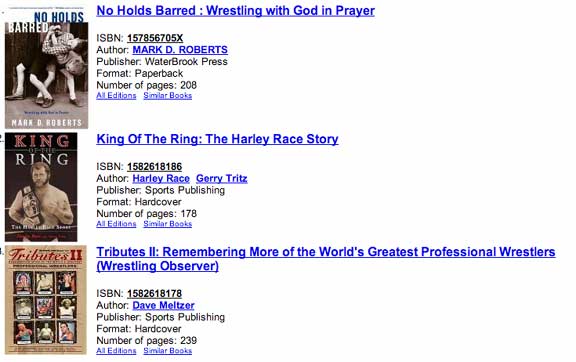 |
| |
|
As you can tell, the websites that were featuring my book were devoted to real wrestling, not wrestling as a metaphor for relationship with God. They had books about so-called "pro" wrestling (WWF, now WWE) and well as more serious Olympic-style wrestling. So, nestled within the books that will teach you how to apply a "Springboard Front-Face Neckbreaker" or a "Jumping Leg Facebuster," is my book that encourages you to pray with greater honestly and intimacy.
I think it's good for me when things like this happen. I have a tendency to take myself too seriously at times, especially when it comes to my projects and programs. So when my book on prayer ends up right next to Pro-Wrestling's Most Punishing Finishing Moves, it helps to keep me humble.
I'm still very serious about praying with greater openness, mind you. Although this can be very pleasant, it's no laughing matter. But it's one thing to take prayer seriously, and quite another to take myself too seriously. |
|
| |
Too bad Mark Ford, my cover designer, and the folks at WaterBrook didn't have the inspiration of Gene LeBell's Grappling World. Now this would have been an eye-catching cover for my book, don't you think? |
Speaking of a book about prayer, you might have wondered why I decided to write one. After all, the subject isn't exactly ignored by other writers. In my next post I'll explain why I thought I had something to add to the literary conversation about prayer.
Why Write Another Book on Prayer? 
Part 5 of the series: No Holds Barred: Ruminations on Publishing and Prayer 
Posted for Monday, June 13, 2005
Since my latest book, No Holds Barred, came out in late March, I've done a couple dozen radio interviews on the book. This is the poor man's version of a book tour. But I like it because I get to talk about my book with a bunch of interested folks, and because I can do this without one bit of traveling. Almost all of my radio interviews, though they play in various states throughout the country, are done through the telephone. Somebody in a radio studio in Florida calls me on the phone and off we go.
One of the most common questions I've been asked in this last round of interviews was: "Given that there are already so many other books on prayer, why have you written No Holds Barred?" Now that's a good question! In fact, when I was proposing this book to my publisher, I did an Amazon search for books in the subject heading of "prayer." I can't remember the exact number of results, but it was something over 20,000. So, given that just about everything worthwhile that could be said about prayer has already been written, why did I write No Holds Barred?
Well, I wasn't just bored, or couldn’t think of anything else to do, so I wrote a book on prayer. In fact, I actually believed – and still do – that I had something to contribute to the conversation. If you boil No Holds Barred down to its bare essentials, here's my contribution:
1. The Psalms are a fantastic, divinely-inspired, and, I might add, greatly underused guide to prayer. From the Psalms God teaches us how to pray.
2. If we take the Psalms seriously, then we'll learn to pray with "no holds barred." The boldness and freedom of the Psalms, whether in confession or praise, whether in desperation or worship, are astounding and inviting.
3. Many Christians, if we're really honest, are sometimes bored in our relationship with God. The Psalms can inject new life into this relationship as we learn to communicate with the kind of freedom God wants from us.
Point 1 is no secret. Throughout the ages Christians have used the Psalms to guide their prayers. Many classic books on the Psalms, by such writers as John Calvin, Dietrich Bonhoeffer, and C. S. Lewis, make this point. But, in my pastoral experience, most Christians today don't make use of the Psalms to guide and enrich their prayer life.
Point 2 is also no secret, though it's not as frequently mentioned in books on the Psalms or on prayer. As I began praying the Psalms in my personal devotions, I was astounded at the things I was saying to God simply because I was reading the Psalms as prayers.
Point 3 comes from my own personal experience and from that of my congregation. As we have used the Psalms in prayer, we have discovered new vitality in our relationship with God. We have emerged from the "prayer ruts" that can so easily limit both our prayers and our relationship with the Lord.
As you can see, I'm not claiming that my book on prayer offers unique insights or "secrets" to prayer. It would be foolish and arrogant for me to think that I have something brand new to say about prayer. In fact, I'd argue that the power of No Holds Barred comes precisely from the fact that it is not new. All I'm really doing is taking the wisdom of the biblical Psalms and making this available to today's reader. To put it crassly, No Holds Barred is a re-packaging of the Psalms, along with insights from some of the great saints who have written on the Psalms. |
|
|
John Calvin |
|
Dietrich Bonhoeffer |
|
C. S. Lewis |
But I think this sort of re-packaging can be helpful. I know from my own experience that systematic praying of the Psalms has made a huge difference in the way I pray. More importantly, it has made a huge difference in my relationship with God. I'd love to be able to encourage others in this same direction, and, in a nutshell, that's why I wrote No Holds Barred.
A Miraculous Beginning 
Part 6 of the series: No Holds Barred: Ruminations on Publishing and Prayer 
Posted for Tuesday, June 14, 2005
Sometimes writing a book flows as if by magic out of an author's inspiration and enthusiasm. I've actually heard of people writing whole books in a matter of days as the words flowed effortlessly. For me, though the initial vision for a book often comes as if by divine inspiration, the actual writing process is much more pedestrian. Often it feels like plodding.
When I began writing No Holds Barred I was excited about the ideas that could make up the core of the book, but I was personally exhausted and not especially eager to start writing. Yet a series of events helped to fire my enthusiasm and even to convince me that God was helping me to write.
It all began when my wife suggested that I take some time away for rest and refreshment. Here's the way I describe it in the first chapter of No Holds Barred:
Sensing the parched condition of my soul, my wife, Linda, suggested that I take a few days off. I soon found myself miles away from civilization in the Sierra Nevada mountains. My sanctuary was Kings Canyon, a glaciated gorge filled with lupine meadows and ponderosa pine forests. Soon I was sitting alongside the South Fork of the Kings River, marveling at the sheer granite cliffs towering above me and the turbulent river at my feet. The rare combination of a heavy snowpack and unseasonably hot weather had turned the South Fork into a roaring torrent.
Finding a private spot, I began praying through the Psalms. Many times before, when my soul was parched, I had turned to these ancient, poetic words of spirituality with a yearning for God’s presence.
I can still remember that moment as I sat in my beach chair by the Kings River. Though the water was roaring, I found myself strangely quiet, as I'd read a psalm to the Lord in prayer, and then reflect on its meaning. "I yearn to be refreshed in Your presence, Lord," I prayed. "Please soften my hard heart." |
|
| |
Kings Canyon at sunset |
Then an amazing thing happened, something I'll never forget as long as I live. Here's what I wrote for the book:
|
While I was reading, movement on the other side of the river caught my attention. A deer was exploring the opposite shore. I figured she was thirsty and looking for a safe place to drink. Finally she found a small cove where the river flowed less ferociously, and she waded into the water, where she remained for several minutes. Periodically she lowered her head to take a deep drink.
As I watched the deer, I saw an image of my own soul. I, too, had come to the Kings River with an intense thirst. It’s no surprise that the first lines of Psalm 42 came to mind: |
|
| |
This scene reminds me of what I saw along the Kings River, though the main channel was flowing very swiftly, unlike in this picture.
|
As a deer longs for flowing streams,
so my soul longs for you, O God.
My souls thirsts for God,
for the living God.
When shall I come and behold
the face of God? (verses 1-2)
I’m generally not one to see life’s coincidences as signs from God, but as I watched this deer, I had to wonder. I was preparing to write a book on experiencing God in prayer, but I was spiritually parched. And only fifteen yards away, a thirsty deer was drinking from a flowing stream. In more than four decades of hiking and camping in the wilderness, I had never seen anything like this. Was God helping me get in touch with my own thirst for him?
I realize that this sounds like one of the fake "preacher stories" that you hear but find it hard to believe. I was also amazed by what happened that day. I have spent much of my life hiking in the forests of California. I've probably seen at least a hundred deer in the wilds. But they're always grazing in a meadow or running through the trees. I had never before seen a deer actually stop for a drink. And never before had I been so close to a deer for so long. I think, in fact, the vigorous motion and the deafening noise of the river kept the deer from realizing that I was sitting so close by, only 20 years away or so.
At any rate, here's the way I used this story in No Holds Barred:
I don’t know whether the Lord sent the deer. But I do know that he used it to break through the dry crust that had hardened my heart—a layer of stress and fatigue that had built up over the past months. As I watched the deer, I felt a yearning for God in a way I had not been able to feel for months. Like that deer, I wanted more than just a sip of living water. I yearned to wade into the healing flow of God’s presence. I longed to drink deeply from the refreshing water of grace. And then to drink again.
Have you ever been so parched that you felt as though you would die if you couldn’t wade into God’s healing presence? Have you wanted to chip the crust off your heart so you could drink deeply from God’s grace? If so, we’re in this together. I wrote this book for you.
I will never know for sure if my seeing the deer was just a bit of extremely good luck, or if it was truly a sign from God. But, given the timing of that event and its impact on me and my writing, I vote for sign. I truly believe that No Holds Barred had a miraculous beginning. God was helping me to feel my yearning for Him and to realize that He was inviting me to drink from the refreshing stream of His presence.
 |
Introducing . . .
No Holds Barred:
Wrestling with God in Prayer
This book is an invitation to a deeper, truer, and bolder relationship with God. Based on the Psalms, No Hold Barred explores the depths of honest prayer, including asking, praising, silence, complaining, and even prayer for vengeance. It includes a study guide for personal or group study by adult classes or small groups
“This inspiring book is an invitation to bold, honest, and passionate communication with God. . . . Mark reminds us of the astounding freedom in prayer we find throughout the Psalms, and encourages us to take advantage of that freedom." - Matt Redman, songwriter, author, worship leader.
To purchase No Holds Barred, click here.
|
|


